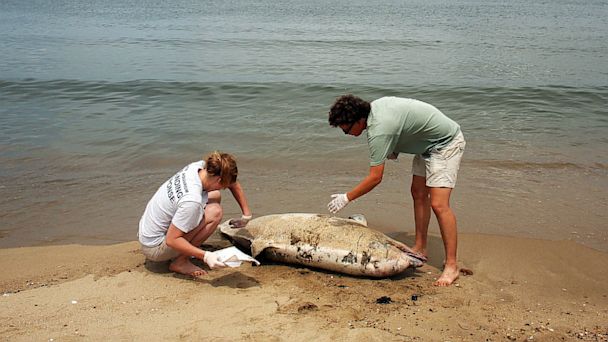Dead Dolphins Wash Up in Disturbingly High Numbers at Risk to Humans
A disturbingly high number of dead dolphins have been washing up on East Coast shores, bringing hidden risks to humans.
"We've been seeing an increase in dolphin deaths along the Jersey coast since the Ninth of July. From that date to present, we're up to 28 dead animals," New Jersey's Marine Mammal Stranding Center founding-director Bob Schoelkopf told ABCNews.com today.
In just the month of July, 91 dead dolphins have washed up in New York, New Jersey, Maryland, Delaware and Virginia, according to the National Oceanic and Atmospheric Administration (NOAA). In 2012, those same states had a combined death toll of nine. There were 16 in 2011.
"When you're seeing a large number of animals stranding for an unknown reason, it's telling us there's something funky going on in the environment and in the water," NOAA Fisheries public affairs officer Maggie Mooney-Seus told ABCNews.com. "Something's not right."

(Image Credit: Dorothy Edwards/The Virginian-Pilot/AP Photo)
As for the cause of the spike, Schoelkopf said, "That's still being studied."
"We are still waiting for lab results to come back," he said. "It takes a while to do all the tests, collection of tissue and analyzing the tissue, so we have no conclusion at this time."
Possible contributing factors could include environmental issues, pollution, interaction with fishing gear and diseases, Mooney-Seus said.
"When it comes to these events, there can be a combination of factors at play," she said. "Right now we're not ruling anything out."
Schoelkopf said his primary concern is the health hazard that comes with humans spotting the stranded dolphins and trying to save them.
He said that in one instance last week, a dolphin washed up in knee-high water during a lightning storm, as well as a shark who started chewing on it. Luckily, Schoelkopf said, the lifeguard had taken the people off of the beach because of the storm.
"If someone is in the water trying to save the animals, they could be bitten as well," he said."That's what we're mainly concerned with, people not trying to get in there and help these animals out. We know that they mean well, but it could jeopardize their health."
Bacteria that can be deadly to humans is also a concern.
"Regardless of whether it's healthy, dead or sick, people need to stay away from them. These are wild animals," Mooney-Seus said. "They can bite and they can transmit diseases to human. It's always wise for people to keep a safe distance."
She added that it's against the law to approach marine animals.
Schoelkopf said that if people spot a dead or ailing dolphin, they should alert a lifeguard or a police department who will send help.
A handful of the dolphins have bronchial pneumonia and at least one was carrying morbillivirus, which Schoelkopf compared to chicken pox in humans. But he emphasized that about two-thirds of the dolphins have still not been tested so, "We don't want to jump the gun on this and blame one particular agent."
A similar spike occurred in 1987 when more than 700 dolphins died and a bacterial infection was identified as the main culprit.